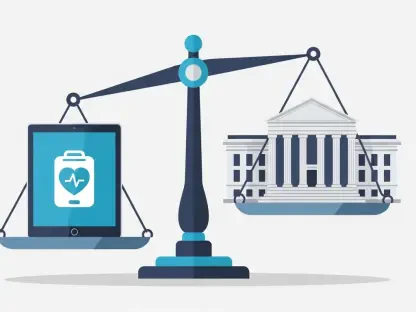The burgeoning emphasis on digital health solutions within the Centers for Medicare and Medicaid Services (CMS) proposed actions reflects a transformative period in healthcare delivery. Introducing the 2026 physician fee schedule, the proposal underscores the vision of enhancing chronic disease management through innovative technological integration. As healthcare systems continue to adapt to new challenges, digital health tools such as telehealth, remote patient monitoring, and digital therapeutics are positioned as pivotal elements shaping modern patient care paradigms. The proposal aims to address inefficiencies and maximize the potential of such technologies to create sustainable and accessible healthcare frameworks. By advocating for these advancements, the CMS initiative appears poised to influence not only the delivery of care but also the landscape of healthcare policy and reimbursement.
Digital Health Focus
Digital health presents a powerful avenue for addressing chronic disease management, and the CMS proposal recognizes this by encouraging adoption and innovation across various care settings. A key emphasis in the proposal is fostering an environment where telehealth and remote patient monitoring (RPM) become integral in managing chronic conditions. Given the growth of these technologies and their proven benefits, CMS has developed strategies to increase their reach and effectiveness. The proposal advocates for eliminating certain restrictions traditionally limiting telehealth visits, such as frequency limitations in specific healthcare settings. Moreover, it suggests permanent allowances for direct supervision to be conducted via telehealth, a move designed to replace previous temporary policies and enhance the viability of remote care solutions.
The removal of these barriers marks a significant stride toward making telehealth a core component of chronic disease management. However, while CMS advances these initiatives, it maintains a moderated approach. The agency, guided by Administrator Mehmet Oz, M.D., deliberated balancing digital health adoption with a measured evaluation. To this end, not all digital health applications, especially digital mental health technologies (DMHTs), have been immediately embraced. CMS’s decision to evaluate these technologies on a case-by-case basis underscores a cautious but steady movement towards data-driven healthcare improvements. This strategic approach highlights an alignment of innovation with proven efficacy, gradually integrating evidence-based technology in patient care practices.
Trends in CMS Policy
Over recent years, CMS has charted a course that increasingly integrates digital solutions into healthcare delivery, with a particular focus on chronic care. Reflecting upon past initiatives with wearables and healthcare tech feedback, the latest proposal aligns with strategic shifts towards an evidence-based framework. By progressively adapting its policies to encompass cutting-edge technologies, CMS continues to shape the trajectory of healthcare policy. The Trump 2.0 administration’s directives have effectively placed technology at the core of healthcare reform efforts, emphasizing its role in enhancing patient outcomes and reducing systemic inefficiencies.
The organization’s strategy of cautious adoption, particularly regarding DMHTs, aligns with broader industry trends where innovation meets regulation. This selective deployment of digital health technologies ensures that advancements are substantiated by solid data, thereby enhancing both patient and provider trust in digital solutions’ effectiveness. Such a trend encapsulates the notion that digital health integration must reflect proven improvements in care quality and accessibility rather than being embraced solely for innovation’s sake. The broader policy trajectory suggested by the fee schedule highlights the need for incremental yet impactful advancements, leveraging digital health’s transformative potential while adhering to robust evidence as the principal guide.
Emerging Policies on Chronic Disease Management
The CMS proposal undeniably underlines a commitment to employing digital tools for chronic disease management, resonating with the overarching goal to refine preventive care. President Trump’s “Make America Healthy Again” executive order dovetails seamlessly with this ethos by placing preventive care – particularly for chronic illnesses – at the forefront of the healthcare agenda. The proposal suggests exploring new payment methodologies that align with software as a service (SaaS) models and artificial intelligence (AI), acknowledging the existing discrepancies between traditional payment approaches and emerging technology capabilities.
By prompting discussions around the payment infrastructure and reimbursement frameworks for SaaS and AI, CMS sets the stage for continuous evolution in chronic care methodologies. This initiative not only acknowledges the rapid pace of digital solution advancements but also recognizes the potential of these tools to reshape health economics by improving disease prevention and management strategies. The solicitation for stakeholder input plays a crucial role, providing a channel through which diverse insights can inform payment realignments that accommodate technological growth.
Telehealth Advancements
The proposal heralds significant changes in the telehealth landscape, streamlining processes to better incorporate new telehealth services into Medicare’s offerings. By reducing procedural steps and reshaping service categories, CMS intends to simplify expanding telehealth services, reflecting a responsive attitude towards incorporating digital health advancements seamlessly. The removal of permanent and provisional service categories indicates a forward-thinking approach, aiming to eliminate unnecessary barriers that have traditionally hampered telehealth’s growth in healthcare provisions.
Further modifications in the fee schedule suggest the inclusion of new behavioral and group therapy codes on the telehealth services list. This proposal demonstrates an acute awareness of mental health as a component of comprehensive healthcare, addressing the increasing recognition of mental wellness’s intersectionality with physical health. By opening up opportunities for telehealth to cater effectively to mental health needs, CMS underscores its commitment to a more holistic approach in healthcare delivery. This alignment of policy with evolving telehealth capabilities is poised to foster wider service accessibility, promoting equitable healthcare practices.
Remote Monitoring Proposals
Remote patient monitoring features prominently within the proposed fee schedule, signaling an evolving approach to chronic disease management through enhanced data analytics. The introduction of new codes for remote physiologic and therapeutic monitoring offers a glimpse into CMS’s commitment to embracing comprehensive technological integration. These new codes necessitate adjustments in data submission and review, encouraging a closer alignment between technology-driven insights and patient care outcomes. By refining criteria for these codes, CMS initiates a substantial shift towards tech-empowered care paradigms, supporting patient engagement and improving chronic disease management practices.
Leveraging remote monitoring’s potential holds promise for fundamental improvements in patient interactions with healthcare systems. This reflects a conscious effort to capitalize on technological advancements that enhance, rather than replace, in-person care engagements. Telehealth and remote monitoring combine to offer robust frameworks that support patients outside traditional healthcare settings, thereby extending the continuum of care while ensuring quality remains uncompromised. Such efforts establish CMS not just as an adopter, but as a crucial facilitator of changes reshaping healthcare systems to be more adaptive and patient-centric in nature.
Digital Therapeutics & Mental Health
The proposal suggests a considered expansion of digital therapeutics, particularly within the realm of mental health care. The CMS’s focus on technologies addressing specific conditions, such as ADHD, underscores a growing appreciation for digital solutions’ potential in fostering effective mental health management. However, the agency has adopted a prudent approach, holding back on indiscriminately incorporating digital technologies without supportive evidence indicating their efficacy. This evaluation ensures that adoption is purposeful and justified, promoting confidence in digital interventions’ capacity to deliver meaningful health outcomes.
The deliberate pace with which CMS approaches digital therapeutics reflects a broader industry trend that values responsible innovation over unfounded expansion. By anchoring digital solutions to validated evidence, CMS ensures that healthcare policymakers and providers work collaboratively towards improving mental health services. The proposal thus reveals a strategic commitment to evolving mental health paradigms by maintaining rigorous standards for clinical relevance and effectiveness. Exploring digital therapeutics in this way elevates the discourse on mental wellness, framing technology not as a substitute but as an enabler of comprehensive health solutions.
Stakeholder Engagement
One of the proposal’s critical aspects involves CMS’s call for stakeholder engagement, a vital component in shaping future healthcare policies. By actively soliciting insights from private sector entities, CMS demonstrates a commitment to incorporating diverse perspectives into public health policy development. This collaboration indicates a receptivity to integrating external expertise and experiences, ensuring that policy advancements reflect stakeholders’ practical realities. Through formal inquiries regarding payment strategies for SaaS and AI, CMS acknowledges the expanding complexities digital healthcare introduces to traditional payment systems.
This collaborative approach aims to bridge gaps between evolving technology landscapes and CMS’s reimbursement models. It’s a move that signifies growing recognition of the fundamental changes digital advancements bring to how healthcare is conceptualized, delivered, and paid for. By paving the way for ongoing dialogue, CMS not only fosters stakeholder involvement but also positions itself as a responsive and adaptive health authority poised to meet future challenges. Engagement with diverse stakeholders strengthens the foundation upon which responsible, technology-enhanced care models can thrive, offering pathways for innovation and policy alignment.
Medicare Diabetes Prevention Program (MDPP)
The Medicare Diabetes Prevention Program (MDPP) emerges as a focal point within the proposed fee schedule, reflecting the pivotal role of digital healthcare in chronic disease prevention. By recommending a potential extension of MDPP’s eligibility to purely online providers, CMS acknowledges the powerful impact digital platforms can have on disease prevention. This proposal recognizes that digital channels offer universal access and sustainability, holding potential for broader participation and improved outcomes in diabetes prevention efforts.
Extending the MDPP signals CMS’s acknowledgment of the increasing importance of digital solutions that circumvent traditional access barriers, emphasizing innovation in preventive care. By easing access requirements and promoting the digital delivery of these programs, CMS aims to enhance primary prevention strategies, anticipating substantial public health benefits. Such measures indicate a strategic resolve to not only sustain but enhance digital healthcare’s role in managing chronic conditions, framing tech-driven solutions as essential tools within contemporary healthcare ecosystems.
Overall Narrative
Digital health plays a crucial role in managing chronic diseases, and the CMS proposal aims to foster its adoption and innovation across various healthcare settings. A central focus of the proposal is to integrate telehealth and remote patient monitoring (RPM) into the management of chronic conditions. These technologies have seen significant growth and proven benefits, prompting CMS to devise strategies to expand their use. The proposal recommends removing certain restrictions that previously limited telehealth visits, including frequency limitations in certain healthcare environments. Additionally, it proposes making permanent the allowances for direct supervision via telehealth, replacing temporary policies to enhance remote care solutions’ viability.
Eliminating these barriers represents a significant step toward incorporating telehealth as a fundamental aspect of chronic disease management. However, as CMS pushes these initiatives forward, it adopts a cautious approach. Under the guidance of Administrator Mehmet Oz, M.D., the agency considers the balance between adopting digital health and ensuring careful evaluation. Notably, CMS evaluates digital mental health technologies (DMHTs) on a case-by-case basis rather than embracing them all at once. This careful strategy underscores a movement toward data-driven improvements in healthcare while integrating evidence-based technology into patient care practices.









